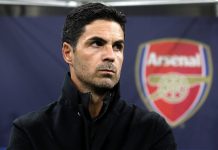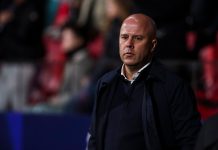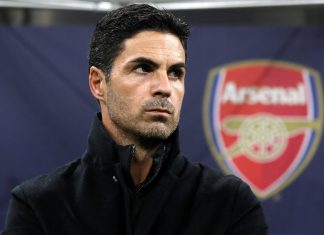As the team proceeded to dominate possession and threaten to actually have a shot on goal, I felt that game was different to previous encounters between Arsenal and Manchester United. And then it happened.
When Fabio threw himself at the ball after Manuel Almunia had parried Javier Hernandez’s header, it seemed all too reminiscent of the game earlier in the season at Old Trafford, when Park-Ji Sung’s arched header won the game.
Arsenal’s only hope of silverware this season is now the Premier League, and they sit in a good position, three points behind United with a game in hand (albeit the game is away to Tottenham). But the stark truth that Arsene Wenger must deal with is that if the club do not win the league this season, he will have failed.
The club policy of recent times has been to develop youngsters and *insert clichéd restatement of Arsenal’s faith in youth flair and potential here*. Whilst Arsenal have failed in recent years to win a trophy, at the end of every season optimism has been kept. A sense that we may not have won anything, but that the first trophy was just a matter of time and that the club was making progress saw to that. The reality was that regardless of results, the team was improving, getting better. They learned how to handle physical play without losing their collective cool. They learned to win games they were not playing well. They learned to go to the North West and beat teams like Bolton. They even learned to beat Chelsea.
But the one thing they have not done yet, and the only thing remaining, is to win the trophy. The whole world knows that Arsenal on their day, can produce mesmeric football and take on the very best, as the victory over Barcelona last month demonstrated. There can be no more progression for Arsenal without a trophy. Coming desperately close in the final weeks of the season and ending up empty handed was last season. To achieve the same thing this year would be to stall, and by default, go backwards. And that would by extension mean that Wenger’s faith in producing a team of promising youngsters who can pass the ball quite well would have failed.
It will require a completely new approach from the club. There are some mitigating circumstances. Injuries continue to affect Arsenal in a way that no other team seems to suffer from. When Arsenal get an injury, it is usually to one of their best players. Recently, they have been without Cesc Fabregas, Robin van Persie as well as long term absentee Thomas Vermaelen. The trio are arguably the club’s best three players, certainly the most important, making up a crucial part of its spine. Theo Walcott has also been out, hampered by injury, whilst Alex Song and Johan Djourou, whose form in recent months was key to putting Arsenal in the position they were two weeks ago, have been injured. The goalkeeper who they thought finally solved that crisis has been laid low, and the second choice is out for the season as well.
If Arsenal were a bit luckier with injuries, it is fair to suppose that they may not have been knocked out of all three cups, and that they may also have a few more points in the league. But this is not a uniquely unfortunate season injury wise. The club tend to suffer from injury crises perpetually. It suggests that something is wrong at the club, that they are either not looking after the players properly, or that they are signing a series of injury prone but talented stars.
But the truth is that Arsenal have won things with injury crises before; 1998 being a prime example. Arsenal once went to Real Madrid without a host of first team players and won 1-0. The problem with the current team is that Wenger’s inability to admit when his side deserve to lose hampers the team’s hopes of learning from defeat. The red card handed to Robin van Persie earlier this week and Edwin van der Saar’s saves for Manchester United were significant factors which contributed to Arsenal’s two defeats this week. But they were not the only reasons for the losses. It was Wenger who isolated Samir Nasri on the left side of the pitch despite being the player most likely to hold onto possession for Arsenal on Tuesday. And against Manchester United, rushed substitutions meant Arsenal could not replace the injured Johan Djourou, which gave Alex Ferguson’s side the time and space to hold onto possession in the crucial last minutes. There will always be mitigating circumstances out of your control which affect the outcome of games. Wenger too easily uses these excuses to explain defeats on their own, rather than as a part of a wider explanation.
There is still a good chance to salvage the season, and to win the league, which would make the campaign a resounding success. The flip side to Wenger’s stubborn nature is that steering so firmly down one path will usually lead to success eventually. But the importance of winning a trophy this season, injuries or no injuries, is paramount to a club who have progressed as far as they possibly can without silverware to show for their efforts.







